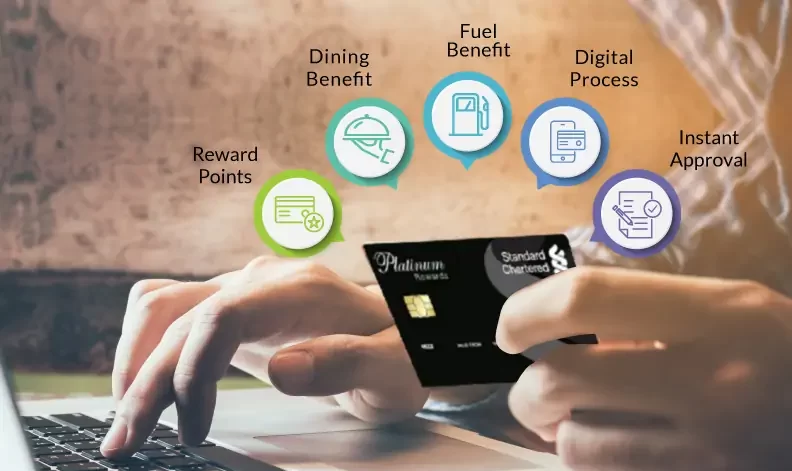Introduction
Choosing the right credit card isn’t just about finding a piece of plastic to swipe—it’s about aligning your financial tools with your lifestyle and spending habits. With so many options available, from rewards credit cards to those focused on building credit, it can be overwhelming. This guide will help you navigate the complexities of credit cards, so you can make an informed decision that best suits your financial needs.
Understanding Different Types of Credit Cards
Before you dive into comparing interest rates and rewards programs, it’s crucial to understand the different types of credit cards available. Each type serves a unique purpose, and knowing these distinctions will help you narrow down your options.
Rewards Credit Cards

Rewards credit cards are designed for consumers who want to earn something back on their purchases. These cards offer incentives like cashback, points, or miles for every dollar spent.
Cashback Credit Cards
Cashback credit cards are straightforward: you earn a percentage of your spending back as cash. If you’re the kind of person who prefers to see immediate rewards for your purchases, this might be the ideal option.
Travel Rewards Credit Cards
Travel rewards credit cards convert your spending into points or miles that can be redeemed for flights, hotel stays, and other travel-related expenses. Frequent travelers can significantly benefit from these cards, especially when they align with their preferred airlines or hotels.
Low-Interest Credit Cards
If you often carry a balance from month to month, a low-interest credit card might be more suitable. These cards typically offer lower Annual Percentage Rates (APRs), which can save you money in interest charges.
Balance Transfer Credit Cards
Balance transfer credit cards allow you to move high-interest debt from one card to another, usually with a lower APR for a limited time. This can be a great way to pay down existing debt without accruing additional interest.
Low APR Credit Cards
Low APR credit cards offer a consistently low interest rate, making them ideal for those who may not always pay off their balance in full each month.
Credit-Building Credit Cards
For those who are new to credit or looking to rebuild their credit score, credit-building cards are a practical choice. These cards typically come with higher interest rates and lower limits, but they’re easier to qualify for.
Secured Credit Cards
Secured credit cards require a security deposit, which acts as your credit limit. They’re a great option for individuals with no credit history or a poor credit score, as they help establish or rebuild credit.
Student Credit Cards
Designed specifically for college students, student credit cards often come with lower credit limits and may offer rewards or incentives for good grades.
Specialty Credit Cards
Specialty credit cards cater to specific needs or types of users, such as business owners or frequent shoppers at a particular store.
Business Credit Cards
Business credit cards are tailored for business expenses, offering higher limits and rewards geared toward travel, office supplies, and other business-related purchases.
Store Credit Cards
Store credit cards are issued by specific retailers and often come with discounts or special financing options when used at that retailer. However, they may have higher interest rates than general-purpose cards.
Key Factors to Consider When Choosing a Credit Card

Choosing the right credit card involves more than just finding the one with the best rewards. You need to consider several key factors that align with your financial situation and goals.
Your Spending Habits
Understanding your spending habits is the first step in selecting a credit card. Are you more likely to benefit from cashback on groceries and gas, or do you want to rack up travel miles? Identifying where you spend the most will guide you to the card that offers the most rewards for your lifestyle.
Interest Rates and Fees
Credit cards come with various interest rates and fees, which can significantly impact your overall cost of using the card.
Annual Percentage Rate (APR)
The APR is the interest rate you’ll pay if you carry a balance on your card. Some cards offer a lower introductory APR, but it’s important to know what the rate will be after the promotional period ends.
Annual Fees
Some credit cards charge an annual fee in exchange for higher rewards or better perks. Make sure the benefits outweigh the cost of the fee.
Credit Limit
Your credit limit is the maximum amount you can borrow on your credit card. A higher limit can be beneficial if you have larger expenses, but it also requires responsible spending to avoid debt.
Rewards and Benefits
Beyond the basic rewards structure, many credit cards offer additional benefits that can enhance their value.
Points vs. Miles vs. Cashback
Decide which type of rewards suits you best—points, miles, or cashback. Each has its pros and cons, depending on how you plan to use them.
Sign-Up Bonuses
Many cards offer sign-up bonuses for new cardholders, such as extra points or cashback after spending a certain amount within the first few months. These bonuses can provide a substantial boost in rewards, making them a factor worth considering.
Introductory Offers
Introductory offers can make a credit card more appealing, especially if you plan to make a large purchase or transfer a balance.
0% APR Offers
Some cards offer 0% APR for a specified period, which can be advantageous if you need time to pay off a big purchase without incurring interest.
Balance Transfer Offers
Balance transfer cards often come with 0% APR on transferred balances for a limited time, allowing you to pay down debt more efficiently.
How to Compare Credit Cards
With so many credit cards available, comparing them effectively is essential to finding the one that best suits your needs.
Using Credit Card Comparison Tools
Online comparison tools can help you see how different cards stack up against each other based on your criteria, such as rewards, fees, and interest rates.
Reading the Fine Print
Always read the fine print before applying for a credit card. This includes understanding the terms and conditions and being aware of any hidden fees.
Understanding Terms and Conditions
Credit card agreements can be dense and full of legal jargon, but it’s important to understand what you’re signing up for. This includes knowing the details of your interest rates, fees, and rewards.
Hidden Fees to Watch Out For
Some cards may come with fees that aren’t immediately obvious, such as foreign transaction fees, late payment fees, or fees for going over your credit limit.
Analyzing Reviews and User Experiences
Reading reviews from other users can provide insights into the real-world performance of a credit card. Look for feedback on customer service, rewards redemption, and any issues that others have encountered.
The Impact of Your Credit Score
Your credit score plays a significant role in the types of credit cards you can qualify for and the interest rates you’ll be offered.
How Your Credit Score Affects Your Choices
A higher credit score typically gives you access to better credit cards with lower interest rates and more attractive rewards. If your credit score is lower, you may need to start with a secured or credit-building card and work your way up.
Improving Your Credit Score for Better Options
If you’re not satisfied with the credit card options available to you, consider taking steps to improve your credit score. This might include paying down debt, making payments on time, and keeping your credit utilization low.
Making the Final Decision
Once you’ve compared your options and considered all the factors, it’s time to make your final decision.
Prioritizing Your Needs
Prioritize what matters most to you—whether it’s earning rewards, paying low interest, or building credit. This will help you choose the card that aligns with your financial goals.
Applying for the Card
When you’re ready, apply for the credit card that best meets your needs. Be prepared to provide information about your income, employment, and credit history.
Conclusion
Choosing the right credit card is a personal decision that should be based on your spending habits, financial goals, and credit situation. By understanding the different types of credit cards and the key factors to consider, you can make an informed choice that will benefit your financial health in the long term. Remember, the right card for you is out there—it just takes a little research and planning to find it.


